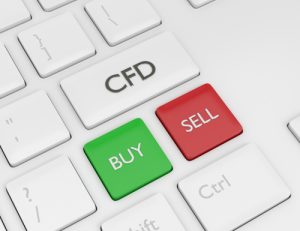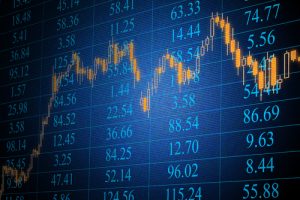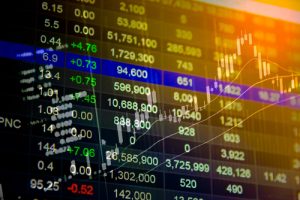 Contracts for difference or CFDs are a popular alternative for individuals and institutions looking for leveraged trading in forex and other asset classes. On the one side, there are thousands of CFD brokers providing trading opportunities to retail and corporate customers on a wide range of financial products across asset classes, and on the other, you have millions of traders vying to profit from these markets.
Contracts for difference or CFDs are a popular alternative for individuals and institutions looking for leveraged trading in forex and other asset classes. On the one side, there are thousands of CFD brokers providing trading opportunities to retail and corporate customers on a wide range of financial products across asset classes, and on the other, you have millions of traders vying to profit from these markets.
In our comprehensive analysis of CFD trading, we cover all there is to know about these markets, right from what CFD means to CFD brokers, CFD trading platforms, CFD trading strategies, and the pros and cons of trading CFDs. While the purpose of the article is to educate freshers or newcomers to get an insight into these markets, we have also highlighted the risks to ensure investors are cautious not only while trading but even before registering with a CFD broker.
What is CFD trading?
“Contracts for difference (CFD)” is an agreement among two parties (in this case, a trader and the broker) to exchange only the cash flow or the difference between the entry and exit prices of the asset. Conducted “Over the counter,” CFD trading does not involve the actual transfer of a physical asset, unlike exchange-traded markets. Instead, they are speculative instruments or employed to hedge one’s physical exposure in forex, commodities, equities, indices, treasuries, or cryptocurrencies.
Difference between trading CFDs and investing with a conventional broker-
The primary difference between the two is the margins. When you buy an underlying asset like shares or a commodity like gold, you pay for it in its entirety. However, when you trade CFDs on the same financial instruments, you are merely betting on the price direction of the underlying asset and are not keen on buying or selling the asset itself. Since there is no physical asset changing hands, your investment is only a small margin plus a daily swap fee, which is either debited or credited to your trading account until you exit the trade. In some instances, CFD brokers also charge a small commission on specific products like equities and index CFDs.
Check out our Broker Reviews for the best broker for your trading.
An illustration of the capital required for CFD trading and the traditional investment approach-

If you are buying 100 shares of Microsoft (NASDAQ: MSFT) at $160 apiece through a regular stockbroker, your total investment would be $160 X 100 = $16,000 + commission.
However, if you trade the Microsoft CFD, you only have to pay a margin of about 5% of the total value of the shares. So, your initial capital outlay would only come to $16,000 X 5% = $800 + commission +/- holding costs.
Regulations governing forex and CFD brokers-
One of the significant drawdowns of trading with a CFD broker is the counterparty risk. With new CFD brokers setting up shop every other day, it’s not uncommon to come across brokers who provide unethical or illegal services, resulting in clients losing their entire deposit for no fault of theirs. In several instances, there is no way to initiate a claim or legal action against these brokers since they are unregulated or under-regulated. This is because of the weak framework of the supervisory agencies that lack the punch to ensure the security of clients from unscrupulous CFD brokers, thereby letting them get away without any difficulty. On the contrary, some regulators have detailed guidelines on the products a CFD broker can offer, the max permissible leverage, and in some cases, have also made it mandatory for the brokers to register with them to provide services to the citizens in that country.
So, even before you register with a forex CFD broker, ensure that the regulators governing the brokerage have the necessary agenda in place to protect your interests as an investor.
In the following table, we have highlighted some of the foremost regulators and a couple of their policy guidelines
| Regulator | Minimum Capital requirements | Max reimbursement under Investor Compensation Fund |
| Cyprus Securities and Exchange Commission (CySEC), Europe | Market makers- €730,000
Intermediary license-€125,000
|
€20,000 max |
| UK Financial Conduct Authority (FCA) | Market makers- €730,000
Intermediary license-€125,000 Restricted broker license- €50,000 |
£85,000 max |
| Australian Securities and Investment Commission (ASIC) | A$1 million | Not available |
| Financial Markets Authority (FMA), New Zealand | NZ$1 million | Not available |
| Financial Sector Conduct Authority (FSCA), South Africa | Not available | Not available |
| Monetary Authority of Singapore (MAS) | Ranges from S$50,000-S$5 million | Not available |
Check out our Broker Reviews for the best broker for your trading.
CFD trading platforms-
 One of the key features of top forex CFD brokers is the trading platforms provided to clients. If we compare CFD brokers and the trading platforms they offer, a vast majority of them deliver the tried and tested agnostic platforms across computers and mobile devices, with only a few also providing their trademark terminals. Then you have a third category that offers a mix of the patented and broker-agnostic platforms. While the quantity of trading terminals provided does not matter, the key is the user interface, reliability, trading resources, and the speed, since it adds to a client’s trading efficiency.
One of the key features of top forex CFD brokers is the trading platforms provided to clients. If we compare CFD brokers and the trading platforms they offer, a vast majority of them deliver the tried and tested agnostic platforms across computers and mobile devices, with only a few also providing their trademark terminals. Then you have a third category that offers a mix of the patented and broker-agnostic platforms. While the quantity of trading terminals provided does not matter, the key is the user interface, reliability, trading resources, and the speed, since it adds to a client’s trading efficiency.
In the following table, we have put together a few prominent trading platforms offered by forex and CFD brokers, along with some of the accessible, dynamic resources.
| Category | MT4 | MT5 | cTrader | Trade Interceptor | MarketsX |
| Proprietary/ Broker- agnostic | Broker- agnostic | Broker- agnostic | Broker- agnostic | Proprietary | Proprietary |
| Languages supported | 39 | 39 | 22 | 2 | 9 |
| Desktop, web, mobile | All three | All three | All three | Desktop, mobile | Desktop, mobile |
| Forex signals | Yes | Yes | Yes | Yes | Yes |
| CFD derivatives | Yes | Yes | Yes | Yes | No |
| Forex calendar | Yes | Yes | Yes | Yes | No |
| Real-time market news | Yes | Yes | No | Yes | Yes |
| Automated trading | Yes | Yes | Yes | No | No |
| One-click orders | Yes | Yes | Yes | Yes | Yes |
| Social trading | No | No | No | No | Yes |
| Copy-trading | Yes | Yes | Yes | No | No |
| Supports US markets | No | Yes | No | No | No |
CFD trading conditions-
One of the critical elements of FX and CFD trading is the trading environment, which broadly comprises products, pricing, execution quality, trade size, spread, margins or leverage, swap rates, and other costs. All traders are very particular that they receive the best trading conditions, which would not only help in speedy order execution but would also ensure that profits are retained and not given away as commission or fees.
In our extensive review of CFD brokers, we have come across numerous trading conditions, some identical-some dissimilar, and we have highlighted some of the best trading conditions that traders should generally consider
- Pricing- The real-time prices that you see on your trading terminal can either be in the form of two-way quotes offered by the forex broker through their dealing desk or from multiple liquidity providers via the STP route. Traders generally prefer competitive pricing that is simple, direct, and without requotes.
- Execution quality- Besides pledging to be fair, honest, and protect clients’ interests, all top CFD brokers generally have an order-driven execution, with trades filled in milli-seconds. Compare CFD brokers to determine the best execution quality.
- Trade size- The minimum trade size offered by all market-making and a majority of STP brokers generally starts with the micro-lot, which is 0.01 for FX pairs. However, the smallest trade size for ECN brokers could begin with the mini-lot (0.1) due to the lack of readily available liquidy providers willing to participate in small lot sizes.
- Spread- When it comes to the bid-ask difference, CFD brokers provide options like RAW, fixed, and variable spread. While the raw spread is the best and generally starts at zero pips for FX pairs, they are typically offered by ECN brokers through their liquidity providers. So, while you consider the lowest spread CFD broker, you should also look at the other cost like commission and fees to arrive at the aggregate trading cost.
- Margins- These vary across regions and largely depend on the regulatory framework and the type of client account. A comparison of CFD brokers would show that while all regulated brokers in Europe and Singapore offer lower leverage for retail clients, those coming under ASIC, FSCA, FMA, and tier-II regulators necessitate lower margins.
- Swap rates- These are costs for holding overnight positions and typically define the interest rate differential between two currencies in a pair. However, in the case of the other CFDs, the swap is the effective borrowing cost for holding long positions and is a component of the base currency. Although swap rates should be standard across brokerages, they are not so in reality. Traders should review CFD brokers and go with the one charging the lowest swap.
- Other costs- Other than the trading conditions mentioned above, potential clients should also review CFD brokers for additional charges like commission and fees. Besides swap costs, some CFD brokers also charge for fund deposits/withdrawals, inactive accounts, premium services, and for various other reasons. Compare CFD brokers and comprehend the least expensive ones.
The order execution framework of all the top CFD brokers broadly details all info related to the pricing of products, speed of order execution, transactional considerations, settlement price, and impact cost. Go through the document to get an in-depth understanding of all the key parameters that categorize the trading conditions at forex CFD brokers before choosing the one that favours your trading style.
Where we stand when it comes to forex and CFD trading in the US-
CFD trading in the US is currently not available due to the limitations imposed on “Over the counter” trading by the country’s independent federal government agency, the Securities and Exchange Commission (SEC). Under the US Securities law, “Over the counter” financial instruments, including CFDs, are under the legislation of the Dodd-Frank Act, and categorized as restricted securities. Besides US citizens, CFD brokers also restrict clients from countries paying taxes in the US. So, until the framework of the Dodd-Frank Act changes to include CFD trading, US citizens who wish to trade in commodities, indices, shares, and cryptocurrencies can invest their funds with the old-fashioned members of financial exchanges.
But, when it comes to forex trading, the US SEC is far more relaxed, permitting forex brokers to operate from the country. The main criteria, however, is that all forex brokers have to mandatorily register with the Commodities Futures Trading Commission (CFTC) and the National Futures Association (NFA). Forex brokers based outside the US and not registered with the NFA are not allowed to accept US citizens.
Reasons for the limited number of FX brokers in the US-
US citizens can legally participate in forex trading. However, when it comes to forex brokers operating in the US, they pale in comparison to the number of forex and CFD brokers functioning in other countries. While this could be due to the stringent regulations, it also ensures investor protection, especially after multiple scams rocked the country in the early 2000s when dubious forex firms swindled about half a billion from thousands of unsuspecting investors.
Following are some of the regulatory guidelines governing forex brokers in the US-
- Forex brokers licensed by NFA and CFTC should have a minimum operating capital of $20 million.
- All forex brokers are subject to weekly reporting of their account balances, besides comprehensive yearly audits.
- Clients cannot hedge or place opposing trades on the same FX pair due to the first-in-first-out (FIFO) rule.
- Max leverage capped at 50:1 for major FX pairs and at 20:1 for minor pairs.
Pros and cons of CFD trading-
Trading CFDs has its own set of advantages and disadvantages. The key benefits comprise accessing a wide range of products across all the major global markets, low margins, multiple spread options, ability to place contra positions, and no expiry date. On the flip side, there are several drawbacks as well, including the absence of central regulation, price manipulation, liquidity, and counterparty risk.
Tabled below are some of the positives and negatives of CFD trading-
| Pros | Cons |
| CFD’s let traders speculate or hedge the price movement of an asset class, across global markets from one single platform. | Since CFDs are traded “Over the Counter,” they carry high-counterparty risk due to weak regulation in many countries. |
| CFDs are available in various contract sizes- from the micro-lot to the standard lot. Besides, clients can also carry out CFD trading in derivatives like futures and options. | While traditional markets expose a trader to higher capital requirements, commission and fees, CFDs attract spread, commission, and swap fees. |
| You have the flexibility to choose the base currency, contract size, and incremental value. | CFD trading comes with liquidity risk, which requires you to monitor prices closely. |
| Some CFD brokers provide clients with access to trade in specialized products like binary and digital options and spread trading. | CFDs are leveraged products with some brokers offering leverage of up to 1000:1, amplifying risk, and capping any chances of traders earning profits. |
| Since CFDs on cash instruments don’t have an expiry date, you can hold on to your trades as long as you wish. | Since CFD’s come with a swap cost for holding overnight positions, they are not suitable for long-term investors. |
| Traders benefit from high leverage or low margins, although it can work both ways. |
The bottom line-
Since launching in the early 1990s as a hedging tool for stocks trading on the London Stock Exchange, CFD trading has grown leaps and bounds across all the major markets with a few exceptions like the US. Not only does CFD trading include thousands of financial instruments across all the asset classes, the trading conditions, and the cutting edge platforms make them one of the most sought after products to speculate, hedge, scalp, and auto trade.
CFD brokers are not as structured as an exchange where there are standardized rules, trading conditions, and an organization to ensure transparency and on-time clearing and settlement of funds. Besides, clients trading with CFD brokers should prepare themselves for liquidity risk during volatile markets, something which you rarely experience with conventional brokers registered with the various financial exchanges. Added to that is the counterparty risk, although these have dropped to a large extent, mainly due to better regulation across most major markets.
Investors excited with the prospect of CFD trading can overcome a majority of hurdles by carrying out due diligence to compare CFD brokers before registering with the one that provides the best trading conditions, client privacy, and security of deposits.
CFD markets are here to stay; there are no two ways about it.
Check out our Broker Reviews for the best broker for your trading.




